新概念英语第二册20课
新概念英语第二册第二十课课后习题答案详解 Lesson

新概念英语第二册第二十课课后习题答案详解Lesson 201. b根据课文第4行 I never catch anything---not even old boots, 只有 b. nevercatches anything 与课文实际内容相同,而其他3个选择都与课文内容不符。
根据课文最后一句I am only interested in sitting in a boat and doing nothingat all! 只有c. doing nothing 是正确答案,而其他3个选择都不符合课文内容。
本句是对主语提问的,回答是. who (谁)是对主语提问的;c. whom(谁)是对宾语提问的;d. whose(谁的)确是对定语提问的;只有b. which 是对做主语的事物提问的,所以选b.本句是带never的否定句,只有b. anything 可以用在否定句中。
而a. nothing若用在否定句中,就会使原句变成肯定意义的句子,不符合题目意思;c. something 只能用于肯定句中;d. everything 也不能用在否定句中。
前面句子 I am even less lucky 中的 less(不及)是表示否定意义的比较级,只有c. not so是表示否定意义的,而其他3个选择都没有否定的意思.只有b. an empty bag 最符合语法。
而其他3个选择都有语法错误。
a. a empty bag 中empty是以元音开头的,前面不能用a 而应该用an; c. empty bag 中 bag 是可数名词,需要用an 来修饰;d. oneempty bag 不符合习惯用法,单数可数名词前通常用不定冠词a 或an 修饰,除非表示强调才用one 修饰。
因此应该选b.只有c. all 才能使这个句子同前一句I am only interested in doingnothing.的含义相符合,all等于the things that ,可以代替doing nothing. 而其他3个选择中a. only 和d. the only 不符合语法,b. the one 不符合题目意思,不能完全表达清楚。
新概念英语第二册笔记-第20课
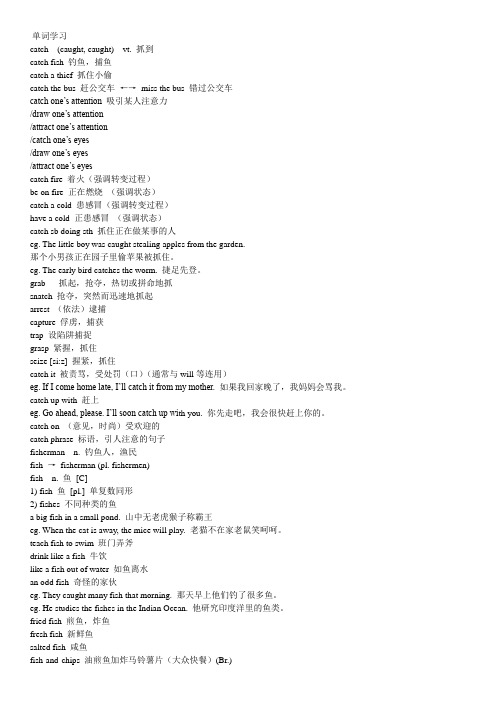
单词学习catch (caught, caught) vt. 抓到catch fish 钓鱼,捕鱼catch a thief 抓住小偷catch the bus 赶公交车←→miss the bus 错过公交车catch one’s attention 吸引某人注意力/draw one’s attention/attract one’s attention/catch one’s eyes/draw one’s eyes/attract one’s eyescatch fire 着火(强调转变过程)be on fire 正在燃烧(强调状态)catch a cold 患感冒(强调转变过程)have a cold 正患感冒(强调状态)catch sb doing sth 抓住正在做某事的人eg. The little boy was caught stealing apples from the garden.那个小男孩正在园子里偷苹果被抓住。
eg. The early bird catches the worm. 捷足先登。
grab 抓起,抢夺,热切或拼命地抓snatch 抢夺,突然而迅速地抓起arrest (依法)逮捕capture 俘虏,捕获trap 设陷阱捕捉grasp 紧握,抓住seize [si:z] 握紧,抓住catch it 被责骂,受处罚(口)(通常与will等连用)eg. If I come home late, I’ll catch it from my mother. 如果我回家晚了,我妈妈会骂我。
catch up with 赶上eg. Go ahead, please. I’ll soon catch up wi th you. 你先走吧,我会很快赶上你的。
catch on (意见,时尚)受欢迎的catch phrase 标语,引人注意的句子fisherman n. 钓鱼人,渔民fish →fisherman (pl. fishermen)fish n. 鱼[C]1) fish 鱼[pl.] 单复数同形2) fishes 不同种类的鱼a big fish in a small pond. 山中无老虎猴子称霸王eg. When the cat is away, the mice will play. 老猫不在家老鼠笑呵呵。
(完整版)新概念英语第二册第20课课文讲解
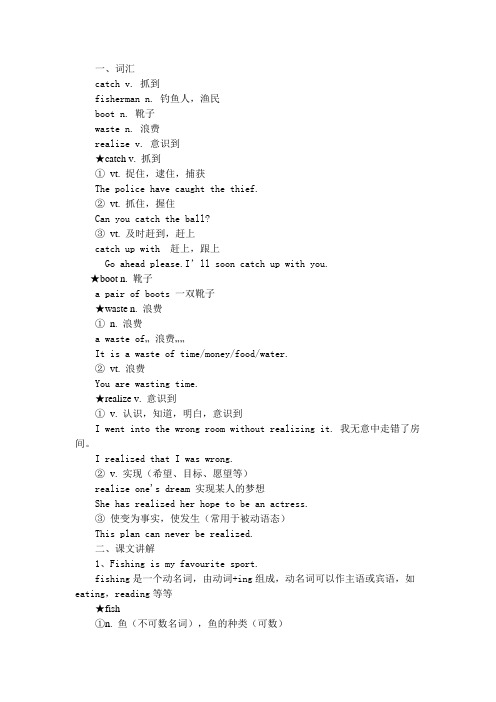
一、词汇catch v. 抓到fisherman n. 钓鱼人,渔民boot n. 靴子waste n. 浪费realize v. 意识到★catch v. 抓到①vt. 捉住,逮住,捕获The police have caught the thief.②vt. 抓住,握住Can you catch the ball?③vt. 及时赶到,赶上catch up with 赶上,跟上Go ahead please.I’ll soon catch up with you.★boot n. 靴子a pair of boots 一双靴子★waste n. 浪费①n. 浪费a waste of… 浪费……It is a waste of time/money/food/water.②vt. 浪费You are wasting time.★realize v. 意识到①v. 认识,知道,明白,意识到I went into the wrong room without realizing it. 我无意中走错了房间。
I realized that I was wrong.②v. 实现(希望、目标、愿望等)realize one's dream 实现某人的梦想She has realized her hope to be an actress.③使变为事实,使发生(常用于被动语态)This plan can never be realized.二、课文讲解1、Fishing is my favourite sport.fishing是一个动名词,由动词+ing组成,动名词可以作主语或宾语,如eating,reading等等★fish①n. 鱼(不可数名词),鱼的种类(可数)There are a lot of fishes(表示种类)in the sea.②v. 钓鱼, 捕鱼2、I often fish for hours without catching anything.for+时间表示一段时间for hours=for some hours 数小时without catching anything作为状语而出现, 表示结果状语。
新概念二 第20课课件

第20课 One man in aboat 独坐孤舟
1.New words 2.text
3.grammer
New words and expressions
New words and expressions
• 1.catch (1.1) /kæ tf/ (caught /ko:t/, caught)v.抓到 • 2.waste(1.6)/werst/n.浪费 • 3.fisherman (l.2)/'fifəmen/n.钓鱼人,渔民 • 4.realize (1.7) /'rielaiz/v. 意识到 • 5.boot (1.3)/bu:t/n.靴子
课文注释
1.l often fish for hours without catching anything. 我经常一钓数小时却一无所获。 without 通常表示“缺乏”、“没有”: I can't repair the car without your help. 没有你的帮助我无法修理这车。 当它位于动名词前时,它表示“不曾”、“不”; They tried to leave the restaurant without paying 他们企图不付账就离开餐馆。
John left the room without telling anyone. 约翰离开房间时不曾告诉任何人。
课文注释
2.Instead of catching fish, they catch old boots and rubbish. 他们往往鱼钓不到,却钓上来些旧靴子和垃圾。 instead有“作为替代”、“反而”等含义,一般以短语形式instead of出现: Jack took part in the race instead of Tony 杰克代替托尼参加了比赛。
新概念英语第二册:第20课课文详解及语法解析
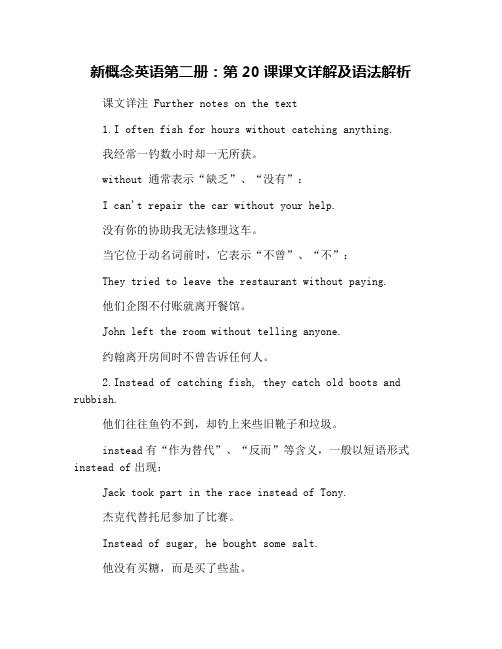
新概念英语第二册:第20课课文详解及语法解析课文详注 Further notes on the text1.I often fish for hours without catching anything.我经常一钓数小时却一无所获。
without 通常表示“缺乏”、“没有”:I can't repair the car without your help.没有你的协助我无法修理这车。
当它位于动名词前时,它表示“不曾”、“不”:They tried to leave the restaurant without paying.他们企图不付账就离开餐馆。
John left the room without telling anyone.约翰离开房间时不曾告诉任何人。
2.Instead of catching fish, they catch old boots and rubbish.他们往往鱼钓不到,却钓上来些旧靴子和垃圾。
instead有“作为替代”、“反而”等含义,一般以短语形式instead of出现:Jack took part in the race instead of Tony.杰克代替托尼参加了比赛。
Instead of sugar, he bought some salt.他没有买糖,而是买了些盐。
副词instead单独使用时一般出现在句尾:If you don't want a holiday in England, why don't you go to Australiainstead?如果你不想在英国度假,那你为什么不去澳大利亚呢?3.I am even less lucky.我的运气甚至还不及他们。
less是little的比较级,意为“不及”、“不如”、“更少”:Tom has got little chocolate, and Jack has got even less.汤姆只有一点儿巧克力,杰克则更少。
新概念英语第二册第20课
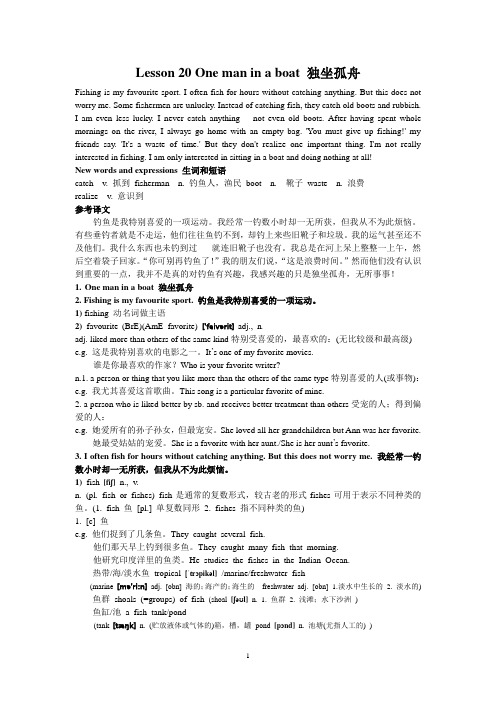
Lesson 20 One man in a boat 独坐孤舟Fishing is my favourite sport. I often fish for hours without catching anything. But this does not worry me. Some fishermen are unlucky. Instead of catching fish, they catch old boots and rubbish.I am even less lucky. I never catch anything -- not even old boots. After having spent whole mornings on the river, I always go home with an empty bag. 'You must give up fishing!' my friends say. 'It's a waste of time.' But they don't realize one important thing. I'm not really interested in fishing. I am only interested in sitting in a boat and doing nothing at all!New words and expressions 生词和短语catch v. 抓到fisherman n. 钓鱼人,渔民boot n. 靴子waste n. 浪费realize v. 意识到参考译文钓鱼是我特别喜爱的一项运动。
我经常一钓数小时却一无所获,但我从不为此烦恼。
有些垂钓者就是不走运,他们往往鱼钓不到,却钓上来些旧靴子和垃圾。
我的运气甚至还不及他们。
我什么东西也未钓到过-- 就连旧靴子也没有。
新概念英语第二册笔记-第20课

单词学习catch (caught, caught) vt.抓到catch fish 钓鱼, 捕鱼catch a thief 抓住小偷catch the bus 赶公交车←→ miss the bus 错过公交车catch one’s attention 吸引某人注意力/draw one’s attention/attract one’s attention/catch one’s eyes/draw one’s eyes/attract one’s eyescatch fire 着火(强调转变过程)be on fire 正在燃烧(强调状态)catch a cold 患感冒(强调转变过程)have a cold 正患感冒(强调状态)catch sb doing sth 抓住正在做某事的人eg.The little boy was caught stealing apples from the garden.那个小男孩正在园子里偷苹果被抓住。
eg.The early bird catches the worm.捷足先登。
grab 抓起, 抢夺, 热切或拼命地抓snatch 抢夺, 突然而迅速地抓起arrest (依法)逮捕capture 俘虏, 捕获trap 设陷阱捕捉grasp 紧握, 抓住seize [si:z] 握紧, 抓住catch it 被责骂, 受处罚(口)(通常与will等连用)eg.If I come home late, I’ll catch it from my mother.如果我回家晚了,我妈妈会骂我。
catch up with 赶上eg.Go ahead, please.I’ll soon catch up with you.你先走吧, 我会很快赶上你的。
catch on (意见, 时尚)受欢迎的catch phrase 标语, 引人注意的句子fisherman n.钓鱼人, 渔民fish → fisherman (pl.fishermen)fish n.鱼 [C]1) fish 鱼 [pl.] 单复数同形2) fishes 不同种类的鱼a big fish in a small pond.山中无老虎猴子称霸王eg.When the cat is away, the mice will play.老猫不在家老鼠笑呵呵。
新概念英语第2册第20课重点语法句型
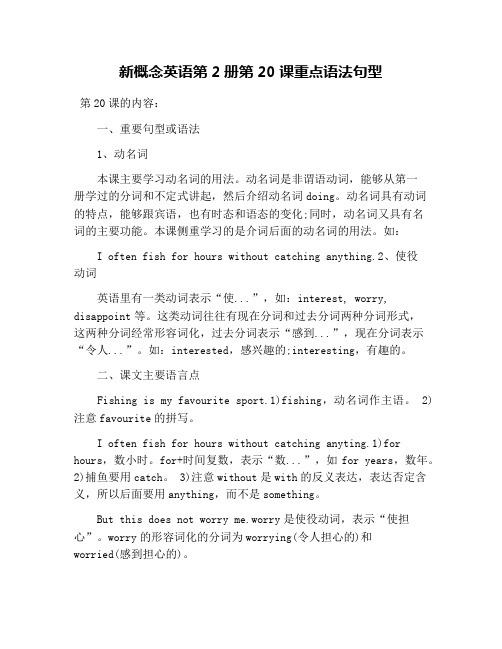
新概念英语第2册第20课重点语法句型第20课的内容:一、重要句型或语法1、动名词本课主要学习动名词的用法。
动名词是非谓语动词,能够从第一册学过的分词和不定式讲起,然后介绍动名词doing。
动名词具有动词的特点,能够跟宾语,也有时态和语态的变化;同时,动名词又具有名词的主要功能。
本课侧重学习的是介词后面的动名词的用法。
如:I often fish for hours without catching anything.2、使役动词英语里有一类动词表示“使...”,如:interest, worry, disappoint等。
这类动词往往有现在分词和过去分词两种分词形式,这两种分词经常形容词化,过去分词表示“感到...”,现在分词表示“令人...”。
如:interested,感兴趣的;interesting,有趣的。
二、课文主要语言点Fishing is my favourite sport.1)fishing,动名词作主语。
2)注意favourite的拼写。
I often fish for hours without catching anyting.1)for hours,数小时。
for+时间复数,表示“数...”,如for years,数年。
2)捕鱼要用catch。
3)注意without是with的反义表达,表达否定含义,所以后面要用anything,而不是something。
But this does not worry me.worry是使役动词,表示“使担心”。
worry的形容词化的分词为worrying(令人担心的)和worried(感到担心的)。
Some fishermen are unlucky.1)注意fisherman的拼写和复数。
2)注意unlucky的构词,即由“un-+luck+-y”构成。
Instead of catching fish,they catch old boots and rubbish.1)instead of,相反、反之。
新概念英语2册20课PPT
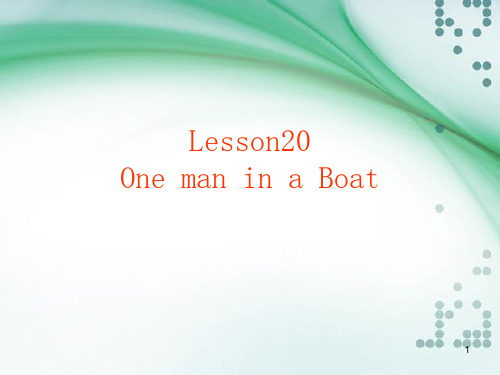
I don’t like that rude fellow at all.
22
Summary writing
• 1. What is the writer's favourite sport?
platform shoes 厚跟鞋 moccasin 软皮平底鞋
leather shoes 皮鞋
sandles 凉鞋 底便鞋
slipper 拖鞋 loafer 平
10
★waste vt./n. 浪费
1) waste vt.浪费
You are wasting time.
Don’t waste your time,money and energy.
after(conj.)+从句,从句主语必须是主句的 主语才能换成下面一种形式
after(prep.)+名词/动词的ing形式 After I go to school,I learned a lot of knowledge. After going to school,I learned a lot of knowledge. After the students handed in their papers, the teacher left. spend time/money/energy on sth. spend time/money/energy (in) doing sth.
Instead of catching fish, they catch old boots and rubbish.
instead of 不做…而做… (可置于句首或句尾) instead of 后面的词一定是没有做的,可以放在
主句后面 without强调没有做某件事,instead of强调这件
新概念英语第二册课堂笔记第20课
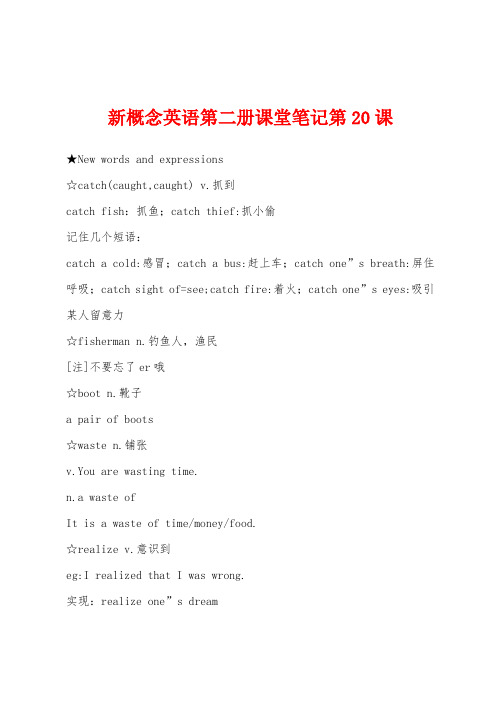
新概念英语第二册课堂笔记第20课★New words and expressions☆catch(caught,caught) v.抓到catch fish:抓鱼;catch thief:抓小偷记住几个短语:catch a cold:感冒;catch a bus:赶上车;catch one”s breath:屏住呼吸;catch sight of=see;catch fire:着火;catch one”s eyes:吸引某人留意力☆fisherman n.钓鱼人,渔民[注]不要忘了er哦☆boot n.靴子a pair of boots☆waste n.铺张v.You are wasting time.n.a waste ofIt is a waste of time/money/food.☆realize v.意识到eg:I realized that I was wrong.实现:realize one”s dream★TextOne man in a boatFishing is my favourite sport.I often fish for hours without catching anything.But this does not worry me.Some fisherman are unlucky.Instead of catching fish,they catch old boots and rubbish.I am even less lucky.I never catch anything-not even old boots.After having spent whole morning on the river,I always go home with an empty bay.”You must give up fishing!”my friends say.”It”s a waste of time.”But they don”t realize one important thing.I”m not really interested in fishing.I am only interested in sitting in a boat and doing nothing at all!●本课的重点是-ing形式☆fish n.鱼:一般状况下作为不行数名词用eg:I have bought some fish.在表示种类时为可数名词eg:There are a lot of fishes in the sea.v.钓鱼-->n.fishing主语通常由名词和代词充当。
新概念英语第二册 Lesson 20

fish hook 钩
fishing line
fishing net 网
【New words and expressions】 catch fisherman boot waste realize v. 抓到 n. 钓鱼人,渔民 n. 靴子 n. 浪费 v. 意识到
★catch v. 抓到(caught; caught) ① vt. 捉住,逮住,捕获 catch fish, catch thief The police have caught the thief. ② vt. 抓住,握住 Can you catch the ball? ③ vt. 及时赶到,赶上 catch the bus:赶车 ----- miss the bus 错过车 ④ catch的一些固定用法 catch a cold:染上感冒---have a cold catch fire:着火(动作)---be on fire(状态) catch one’s attentionh 摒住呼吸 catch sight(看见) of = see : 看见
★fisherman n. 钓鱼人, 渔民 fish→ fisherman [注]不要忘了er哦 1)fish 鱼 (pl.) 单复数同形 They caught many fish that morning. 2)fishes 不同种类的鱼 He studies the fishes in the Indian Ocean drink like a fish 牛饮 like a fish out of water 如鱼离水 fries fish fresh fish salted fish 3)fish v. 钓鱼 go fishing/swimming/shopping fishing in troubled water 浑水摸鱼
逐句精讲新概念英语第二册:第20课独坐孤舟
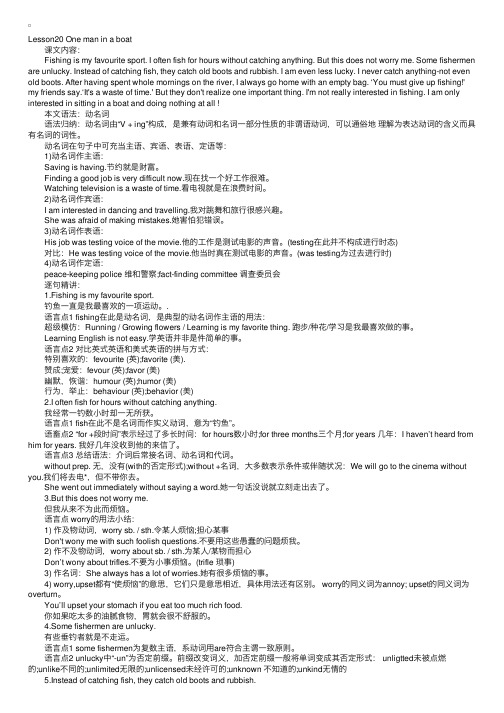
Lesson20 One man in a boat 课⽂内容: Fishing is my favourite sport. I often fish for hours without catching anything. But this does not worry me. Some fishermen are unlucky. Instead of catching fish, they catch old boots and rubbish. I am even less lucky. I never catch anything-not even old boots. After having spent whole mornings on the river, I always go home with an empty bag. ‘You must give up fishing!' my friends say.‘It's a waste of time.' But they don't realize one important thing. I'm not really interested in fishing. I am only interested in sitting in a boat and doing nothing at all ! 本⽂语法:动名词 语法归纳:动名词由“V + ing”构成,是兼有动词和名词⼀部分性质的⾮谓语动词,可以通俗地理解为表达动词的含义⽽具有名词的词性。
动名词在句⼦中可充当主语、宾语、表语、定语等: 1)动名词作主语: Saving is having.节约就是财富。
Finding a good job is very difficult now.现在找⼀个好⼯作很难。
Watching television is a waste of time.看电视就是在浪费时间。
新概念英语第二册第20课完整ppt课件

精选ppt
Lesson20 One man in a boat
• Fishing is my favourite sport.
• fish + ing = fishing • v. + ing = 动名词 (做主语) • I often fish for hours without catching
anything. • fish (v.) 钓鱼 • for + 一段时间 • without (prep.)没有 • He left without telling me. • catching 动名词做精宾选pp语t
• But this does not worry me.
• worry (v.) 使…担心
精选ppt
• ☺ 懂得,理解 = understand • catch the sentence
• ☺catch up with sb. • 赶上… • catch one’s atth fire • 着火
精选ppt
• 2. fish ☺(c. n.) 鱼
and doing nothing at all ! • only 只是 • = just • not at all
精选ppt
• Fishing is my favourite sport. I often fish for hours without catching anything. But this does not worry me. Some fishermen are unlucky. Instead of catching fish, they catch old boots and rubbish. I am even less lucky. I never catch anything-not even old boots.
新概念英语第二册课堂笔记:第20课
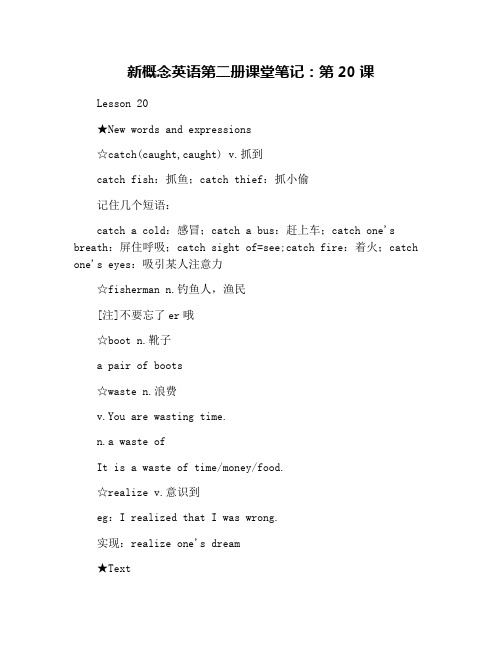
新概念英语第二册课堂笔记:第20课Lesson 20★New words and expressions☆catch(caught,caught) v.抓到catch fish:抓鱼;catch thief:抓小偷记住几个短语:catch a cold:感冒;catch a bus:赶上车;catch one's breath:屏住呼吸;catch sight of=see;catch fire:着火;catch one's eyes:吸引某人注意力☆fisherman n.钓鱼人,渔民[注]不要忘了er哦☆boot n.靴子a pair of boots☆waste n.浪费v.You are wasting time.n.a waste ofIt is a waste of time/money/food.☆realize v.意识到eg:I realized that I was wrong.实现:realize one's dream★TextOne man in a boatFishing is my favourite sport.I often fish for hours without catching anything.But this does not worry me.Some fisherman are unlucky.Instead of catching fish,they catch old boots and rubbish.I am even less lucky.I never catchanything-not even old boots.After having spent whole morning on the river,I always go home with an empty bay.'You must give up fishing!'my friends say.'It's a waste of time.'But they don't realize one important thing.I'm not really interested in fishing.I am only interested in sitting in a boat and doing nothing at all!●本课的重点是-ing形式☆fish n.鱼:一般情况下作为不可数名词用eg:I have bought some fish.在表示种类时为可数名词eg:There are a lot of fishes in the sea.v.钓鱼-->n.fishing主语通常由名词和代词充当。
逐句精讲新概念英语第二册第20课 独坐孤舟
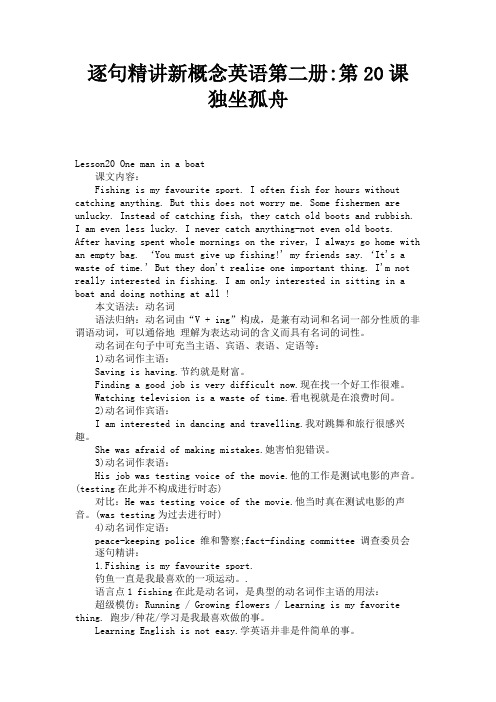
逐句精讲新概念英语第二册:第20课独坐孤舟Lesson20 One man in a boat课文内容:Fishing is my favourite sport. I often fish for hours without catching anything. But this does not worry me. Some fishermen are unlucky. Instead of catching fish, they catch old boots and rubbish.I am even less lucky. I never catch anything-not even old boots.After having spent whole mornings on the river, I always go home with an empty bag. ‘You must give up fishing!' my friends say.‘It's a waste of time.' But they don't realize one important thing. I'm not really interested in fishing. I am only interested in sitting in a boat and doing nothing at all !本文语法:动名词语法归纳:动名词由“V + ing”构成,是兼有动词和名词一部分性质的非谓语动词,可以通俗地理解为表达动词的含义而具有名词的词性。
动名词在句子中可充当主语、宾语、表语、定语等:1)动名词作主语:Saving is having.节约就是财富。
Finding a good job is very difficult now.现在找一个好工作很难。
新概念英语第二册20课 One man in a boat

instead of doing...they did...没 有做...而是做...
• instead of going to the cinema, he stayed at home.
• go shopping/go to the park. • read a book/read a magazine. • go to school/go fishing • have dinner at home/go to the
Lesson 20
One man in a boat
What i Watching TV? / playing vidio games? /going shopping? /reading books?
How do you think of fishing? Are you interested in it ?
realize 和understand
• realize: become aware, sometimes suddenly
• (通过感官或是意识作用的) • understand: 懂,理解 (通过一定的解
释,思考,学习了一定的知识后或是有 过同样的经历,感觉而知道) • I realized he was mad. • He didn't realize that he had made a mistake. • 他没有意识到自己犯了个错误
waste
• v. 浪费 • We should not waste time. • n. 浪费 • It's only a waste of time to speak to
her. • 和她说话纯粹是浪费时间。 • a waste of… 浪费…… • It is a waste of
新概念英语第二册第二十课课后习题答案详解lesson20

新概念英语第二册第二十课课后习题答案详解Lesson 201. b根据课文第4行I never catch anything---not even old boots, 只有b. nevercatches anything 与课文实际内容相同,而其他3个选择都与课文内容不符。
根据课文最后一句I am only interested in sitting in a boat and doing nothingat all! 只有c. doing nothing 是正确答案,而其他3个选择都不符合课文内容。
本句是对主语提问的,回答是. who (谁)是对主语提问的;c. whom(谁)是对宾语提问的;d. whose(谁的)确是对定语提问的;只有b. which 是对做主语的事物提问的,所以选b.本句是带never的否定句,只有b. anything 可以用在否定句中。
而a. nothing若用在否定句中,就会使原句变成肯定意义的句子,不符合题目意思;c. something 只能用于肯定句中;d. everything也不能用在否定句中。
前面句子I am even less lucky 中的less(不及)是表示否定意义的比较级,只有c. not so是表示否定意义的,而其他3个选择都没有否定的意思.只有b. an empty bag 最符合语法。
而其他3个选择都有语法错误。
a. a empty bag 中empty是以元音开头的,前面不能用a 而应该用an;c. empty bag 中bag 是可数名词,需要用an 来修饰;d. oneempty bag 不符合习惯用法,单数可数名词前通常用不定冠词a 或an 修饰,除非表示强调才用one 修饰。
因此应该选b.只有 c. all 才能使这个句子同前一句I am only interested in doingnothing.的含义相符合,all等于the things that ,可以代替doing nothing. 而其他3个选择中a. only 和d. the only 不符合语法,b. the one 不符合题目意思,不能完全表达清楚。
- 1、下载文档前请自行甄别文档内容的完整性,平台不提供额外的编辑、内容补充、找答案等附加服务。
- 2、"仅部分预览"的文档,不可在线预览部分如存在完整性等问题,可反馈申请退款(可完整预览的文档不适用该条件!)。
- 3、如文档侵犯您的权益,请联系客服反馈,我们会尽快为您处理(人工客服工作时间:9:00-18:30)。
●LESSON 20
1.生词与短语
1)catch
表示捉到的时候,还可以用:grab,seize,hold,take hold of等等
Catch fish 钓鱼,捕鱼
Catch thief 抓住小偷
Catch the bus 赶公共汽车→miss the bus 错过公共汽车
catch one’s attention Catch one’s eyes
draw one’s attention Draw one’s eyes }吸引某人注意力
attract one’s attention Attract one’s eyes
catch fire 燃烧,着火(强调动作)
be on fire 燃烧着的,着火的(强调状态)
Catch a cold 患感冒(强调动作)
Have a cold 患感冒(强调状态)
Catch sb. doing sth 抓住某人正在做某事
Eg. The little boy was caught stealing apples from the garden.这个小男孩正在偷苹果被.抓住了。
Eg. The early bird catches the worms. 早起的鸟儿能捕到虫子。
(谚语的实际含义:捷足先登)
【同义词区分】
grab 抓起,抢夺,热切或拼命地抓
snatch 抢夺,突然而迅速地抓起
arrest (依法)逮捕
capture 俘虏,捕获
trap 设陷阱捕捉
grasp 握紧,抓住
seize 握紧,抓住
catch it 被责骂,受处罚【口】(常与will等连用)
Eg. If I come home late , I’ll catch it from my mother. 如果我回家晚了,妈妈会骂我的。
catch up with 赶上(某人)
eg. Go ahead , please. I’ll soon catch up with you.
Catch on (意见,时尚)受欢迎的
Catch phrase 标语,引人注目的句子
2)fish
Fish →fishman (pl. fishmen)
Fish 鱼(c.)n..
⑴fish 鱼(pl.)单复数头同形⑵fish 不同种类的鱼
A big fish in a small pond. 一个小池塘里的大鱼(中文寓意:山中无老虎,猴子称霸王)Eg. When the cat is away, the mice will play.
当猫不在的时候,老鼠就开始玩儿了。
(谚语:老猫不在家,耗子上房吧)
Teach fish to swim 班门弄斧
Drink like a fish 牛饮
Like a fish out of water 如鱼离水
An odd fish 奇怪的家伙
Eg. He studied (v. 研究) the fish es in the Indian Ocean(n. 印度洋).
Fried fish 煎鱼
Fresh fish 新鲜的鱼
Salted fish 咸鱼
Fish鱼(v.)捕鱼,钓鱼
我喜欢
..钓鱼:I like/ enjoy/ am fond of/ am keen on fishing.
Fish in troubled water 混水摸鱼
Fish for compliments 沽名钓誉
3)boot
A pair of boots 一双长筒靴
Have one’s heart in one’s boots 极为悲观消沉
Have one’s heart in one’s mouth 极为恐惧
4) waste
v.:
Eg. All the efforts were wasted. 一切的努力都白费了。
n.:
A waste of 对……的浪费
Go to waste 变成废物
Waste away (人、体力)衰弱
Wastebasketball 字纸篓(Am.)
Wastepaper basketball字纸篓(Br.)
5) realize
⑴认识到,意识到(不用于被动语态和进行时,人作主语)
⑵实现(可用于被动、主动语态)
Come true 成为现实(永远没有被动语态,以物为主语)
Real adj. 真的
Reality n. 现实
2.关键句型
【动名词】
1)动名词作主语:Fishing is my favorite sport.
2)动名词作表语:Keeping money you have found is stealing.
3)动名词作宾语:
以下动词通常加动名词作宾语:
Admit 承认finish 完成Appreciate 欣赏,感激mind 介意
Avoid 避免practise 练习Complete 结束resent 憎恨
Delay 推迟risk 冒险
Deny 否认suggest 建议
Enjoy 喜欢allow 允许
Fancy 想象permit 允许
4)动名词作介词的宾语:
Eg. He insisted on doing it in his own way. 他坚持用他自己的方式做这件事情。
5)动名词作定语:通常表示某种功能的
.........
A reading room 阅览室
A dinning room 餐厅
A swimming pool 游泳池
A sleeping car 火车的卧铺车厢
3.课文
1)favourite(没有最高级和比较级)
2)without介词(prep.)prep.+n./v.+ing/pron.(代词)
3)worry
Be worried about = be anxious(非常担忧) about
4)instead of
5)rubbish
A pile of rubbish 一堆垃圾
A heap of rubbish 一堆垃圾
Don’t talk rubbish!别说废话了!
【同义词区分】
Garbage⑴(厨房里的)菜屑碎肉,残羹剩肴,垃圾(Am.)
⑵(口)不足取的东西,愚蠢的想法
Garbage can(Am.)垃圾桶
Dustbin(Br.)垃圾桶
Garbage collector(Am.)垃圾收集清洁员
dustman(Br.)垃圾收集清洁员
Garbage truck(Am.)垃圾车
dustcart(Br.)垃圾车
※refuse当读[r e'f j u: s]时,译为“拒绝”
当读['r ef j u: s]时,译为“垃圾”
6)even 甚至
More lucky 更加幸运
Less lucky 更加不幸
Less 更不……(消极比较级)
A is less + 原级than B
A比B更不……
Eg. I am less happy than before. 我比以前更不愉快/更痛苦。
Eg. This story is less interesting than that one. 这个故事比那个更无聊。
Not as/ so…as 不及,不如
Eg. I am not so happy as before. 我没以前那么愉快。
(现在不一定不快乐)
Eg. This story is not so interesting as that one. 这个故事没那个有趣。
(也许这个也很有趣)
7)after (prep./conj.(连词))
仅当从句主语与主句的主语一致时,才可以省略作after doing…
8)spent time/ money/ energy on sth./ (in) doing sth.
9)give up放弃
give up fishing 不要再钓鱼了/停止钓鱼
give up smoking 戒烟
give up fighting 放弃作斗争
(难点)10)It’s(它是,表语)/Its(它的,形容词)
(难点)11)realize认识到,意识到
understand 理解,懂得,明白
【同义词区分】
Eg. I realize that he was mad. 我意识到他疯了。
Eg. I don’t understand English. 我不懂英语。
Eg. I realize that I had been wrong. 我认识到我错了。
(难点)12)be interested in sth./ doing sth.对……感兴趣(一般人做主语)Interesting 令人感兴趣的(一般物做主语)
类似的还有:excited/ exciting
Surprised/surprising
disappointed/disappointing
ing形式,表示令人感到……ed形式,表示自己感到……
13)sit in a boat坐在船上
Be in the same boat 同舟共济
Burn one’s boat behind oneself 破釜沉舟
Rock the boat (因意见不同)搅局,捣乱
Miss the boat 坐失良机
14)at all 根本,丝毫
Not at all 根本不
4.【拓展】
量词:
a shock of [正式]一头浓密的(头发)
a sheet of 一张,一片,一块(扁平物品如纸、玻璃等)。
